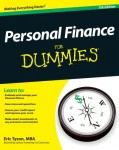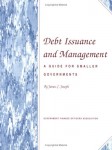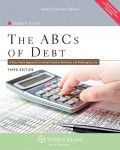Debt
The proven guide to taking control of your finances
The bestselling Personal Finance For Dummies has helped countless readers budget their funds successfully, rein in debt, and build a strong foundation for the future. Now, renowned financial counselor Eric Tyson combines his time-tested financial advice along with updates to his strategies that reflect changing economic conditions, giving you a better-than-ever guide to taking an honest look at your current financial health and setting realistic goals for the future.
Inside, you’ll find techniques for tracking expenditures, reducing spending, and getting out from under the burden of high-interest debt. Tyson explains the basics of investing in plain English, as well as the risks, returns, and options for popular investment strategies. He also covers ways to save for college and special events, tame your taxes, and financially survive the twists and turns that life delivers.The bestselling, tried-and-true guide to taking control of finances, now updated to cover current economic conditionsProvides concrete, actionable advice for anyone facing great financial hardshipHelps you avoid or get out of debt and budget funds more successfullyEric Tyson, MBA, is a nationally recognized personal finance counselor and the author of numerous For Dummies titles, including Home Buying For Dummies, Investing For Dummies, and Mutual Funds For Dummies, among others
There’s no need to stress over an uncertain economy — just read Personal Finance For Dummies and protect your financial future!
Conventional wisdom holds that all nations must repay debt. Regardless of the legitimacy of the regime that signs the contract, a country that fails to honor its loan obligations damages its reputation, inviting still greater problems down the road. Yet difficult dilemmas arise from this assumption. Should today’s South Africa be responsible for apartheid-era debt? Is it reasonable to tether postwar Iraq with Saddam Hussein’s excesses?
Rethinking Sovereign Debt is a probing historical analysis of how sovereign debt continuity–the rule that nations should repay loans even after a major regime change, or expect reputational consequences–became the consensus approach. Odette Lienau contends that the practice is not essential for functioning international capital markets, and demonstrates how it relies on ideas of absolutist government that have come under fire over the last century. Challenging previous accounts, Lienau incorporates a wealth of original research to argue that Soviet Russia’s repudiation of Tsarist debt and Great Britain’s 1923 arbitration with Costa Rica hint at the feasibility of selective debt cancellation. She traces the notion of debt continuity from the post-World War I era to the present, emphasizing the role of government officials, the World Bank, and private-market actors in shaping our existing framework.
Lienau calls on scholars and policymakers to recognize political choice and historical precedent in sovereign debt and reputation, in order to move beyond an impasse when a government is overthrown.
How to Get Out of Debt
Quickly eliminate your debt forever!
Power down your debt by following proven simple Biblical principles. Learn how to:
Create Your Own Personal Financial Statement(PFS) and Find Your NET Worth
Finances do not need to be so complex. I show you what makes up a Personal Financial Statement and how to read it. What a great and not so great financial statement looks like. You will learn what your true NET worth is and how “getting rich” is really a simple matter of changing a negative to a positive or “greater than” to a “less than”.
Increase Your Income and Learn What the Bible Says About Income
That means digging into the different types of income. I show you what retirement really means and that it is definitely possible to retire young and retire rich. Also, what the Bible says about being rich. Learn how to get started with new investments such as real estate or buying an existing business. I show you some simple checks and balances for reviewing a business before you buy it.
Analyze Your Expenses and Eliminate Unnecessary Expenses
Using your Personal Financial Statement/NET Worth Calculator (* Bonus (no-cost) download from my website) you will see the expenses that you can eliminate that will help you get out of debt quickly. I show you the difference between a good debt and a bad debt and why not all debt is bad.
Get Out of Debt Using My KO Debt Plan
Learn how to knock out(KO) your debt one at a time. Your goal should be to live debt-free and with my KO Debt Plan you can achieve that at an accelerated pace. I show you specific examples of the simple process of removing your debt. In addition I will show you:
• What your financial action plan should look like
• Why you should tithe
• How much money you should tithe
• How much house you can really afford and why you shouldn’t rely soley on real estate agents and bankers.
Note: These principles are based on what it says in the Bible. Regardless, if you are “religious” or not you can benefit from applying these methods. I am not interested in preaching to you but I am excited to share what I have learned and the freedom that comes along with being debt-free.
About The Author
If you know me, you know that my mind never rests. I like to get things done. I like to try new things. And most of all, I like to succeed. While success may mean different things to different people we can all agree that winning is always better than losing. My desire for you is to minimize the times you lose.
My investments include businesses, real estate and stocks. I strive to help others maximize their time and succeed financially as well as personally. I hate bad debt! Also, I love to write and actively cover financial, business (marketing, social media & blogging) and lifestyle topics on my blog (http://5minaday.com)
Learn how to get out of debt. Scroll up &click the buy button now.
Product Features
- Used Book in Good Condition
Jason Manolopoulos lends a unique perspective, based on experience of the global financial system, emerging markets and crises, European politics and Greek society, to demonstrate how one of the EU’s smaller countries played a catalytic role in a crisis that threatens the future of the euro, and possibly even of the European Union itself. He digs beneath the headline economic data to explore the historical legacy and psychological biases that have shaped an ongoing political drama, in a book that has profound implications for our understanding of economics, as well as the policy choices for Europe’s elite.
For more information please visit the book website: http://greecesodiousdebt.anthempressblog.com/
In 2001, Greece saw its application for membership into the Eurozone accepted, and the country sat down to the greatest free lunch in economic history. However, the coming years of global economic prosperity would lead to unrestrained spending, cheap borrowing, and a failure to implement financial reform, leaving the country massively exposed to a financial crisis—which duly struck.
In Bust: Greece, the Euro, and the Sovereign Debt Crisis, Bloomberg columnist Matthew Lynn explores Greece’s spectacular rise and fall from grace and the global repercussions of its financial disaster. Page by page, he provides a thrilling account of the Greek financial crisis, drawing out its origins, how it escalated, and its implications for a fragile global economy. Along the way, Lynn looks at how the Greek contagion has spread like wildfire throughout Europe and explores how government ineptitude as well as financial speculators compounded the problem.
Blending financial history, politics, and current affairs, Lynn skillfully tells the story of how one nation rode the wave of economic prosperity and brought a continent, a currency, and, potentially, the global financial system to its knees. Lively, engaging, and thought provoking, Bust reminds us just how interconnected the world really is.
Q&A with Author Matthew Lynn
Author Matthew Lynn Bust looks at how the sovereign debt crisis started in Greece, but why did it start there?
Greece was one of the most profligate nations in the world. It has been virtually continually in default on its debts in one form or another ever since the modern Greek state was created in the nineteenth century. So it was always a fairly good candidate.
At the start of 2010, the markets were already getting worried about sovereign debt. It was essentially Act II of the credit crunch. Governments all around the world had fixed a private debt crisis by turning it into a public debt crisis: they ran up these huge deficits, both to bail out their banking systems and to boost their economies. But the public debts were never any more sustainable than the private debts.
Greece happened to be the easiest country to make an example of. But if it hadn’t been Greece, it would have been someone else.
This was really a crisis about the markets refusing to sanction unending government deficits – and that’s what the book explores.
But the book implies this is a story about the euro as well? Why is that?
It certainly is. The sovereign debt crisis blew apart the euro, and it is going to be very hard to put it back together. Europe’s single currency celebrated its first decade of existence in pretty good shape. The currency was stable, new members were joining, and it was gaining ground on the dollar as the world’s most important currency.
But then the Greeks came along and put a bomb underneath it.
Greece lied and cheated its way into the euro. It completely made up the figures that squeezed it into the euro, and, once it was inside, made no attempt to play by the rules. When confidence in the country collapsed, they expected the rest of Europe to bail them out. But what kind of club is it where you can cheat your way in, ignore the rules, then expect the other members to pick up your bar bills? Not one that anyone is going to want to belong to for long.
So this is not just a story about the sovereign debt crisis – it is a story about how the euro is falling apart, and how that will change the European Union as well.
What did you learn from writing the book?
The book was a real education for me. That was one of the reasons I wrote it. I wanted to learn more about how this fairly small country right on the edge of Europe which no one usually paid very much attention to was suddenly right at the epicentre of a major financial crisis.
It’s not the kind of story you can make sense of just by reading a few headlines. There were so many strands that had to be pulled together. The history of Greece, and why its economy was so underdeveloped. The design of the euro, and all the compromises that led up to its creation that proved to be crippling once the crisis struck. The changing nature of Germany, how it had overcome post-war guilt, and why it was refusing to bail-out the rest of Europe any more. The build-up of government debt right around the word. All of these big themes came together to produce this crisis, and that is what made it such a fascinating book to write.
What are the implications for the world economy of the themes you explore in the book?
Firstly, it’s the end of the euro, at least in its current form. It was a disaster to bail-out Greece, and, curiously enough, I think a lot of the people right at the very top of the policy-making debate knew that. It created a single currency with all the wrong incentives. It would have been far better to let Greece go bust and then to deal with the consequences of that than to try and patch up a broken system. But, in the end, and this process is detailed in the book, they shied away from that, and just threw money at the problem instead.
But it’s not going to work, and the euro is going to slowly unravel as a result. It might be three years, maybe five, maybe ten. But it going to happen, and it is going to be very messy.
But it is also the end of state profligacy, at least in the developed world. For about thirty years, governments have been consistently spending more than they raise in taxes. It’s a very easy option – spending money is a lot more popular than raising taxes. They did it by just continually adding to the debt.
In that respect, the politicians just reflected their electorates. Much the same thing happened in the private sector. In Europe and the U.S., ordinary people didn’t get much wealthier in the last thirty years, they just took on more and more debt.
But this crisis represents the end of that road. You can’t just keep on piling on more and more debt. As the title puts it, the system is bust. And the road is going to be much harder from now on.
Laura Newland’s generation has worked the hardest to gain admission to elite colleges and paid the most to attend. But when Newland left her Alabama hometown and arrived at Duke University, she found a liberal arts campus unlike anything depicted in those glossy guidebooks. The hypercompetitive battle for internships begins freshman year, and the economic pressures–student loans, the daunting cost of graduate degrees, high unemployment–are relentless. This perfect storm, brewing on campuses across the country, has fueled a Wall Street recruiting machine that is winning over the best and the brightest. In no time, Newland was seduced.
From Newland’s turbulent four years comes a provocative story of the higher education industry; the tension between ambition and indebtedness, privilege and purpose; and one student’s journey to make sense of it all.
Let’s get real ladies! Whether voluntarily or involuntarily, managing money is a reality that we all (especially as women) will face at some point in life; we might as well do it right! This book will be your go-to guide for years to come. Know why? Because whether you’re a busy wife, single mother, young professional, a tad more seasoned gal or somewhere in between, it tackles the fears, struggles and questions hundreds of women have asked Patrice over her last decade of helping women get out of debt, rebuild their credit and define their passions. And it’s all done in her down-to-earth, practical and sassy (when necessary) tone. The book’s sections are smartly built around the format of Patrice’s highly acclaimed women’s coaching program, The Mindset + Money Master Class and represent her entire philosophy about personal finance success. After all, it’s what got the Money Maven out of her own $18,000 of credit card debt! Readers are led through practical money lessons and exercises that will help them create wealthy habits, earn more money using their gifts, manage their money wisely and get comfortable having uncomfortable conversations around money.
In this lively history of consumer debt in America, economic historian Louis Hyman demonstrates that today’s problems are not as new as we think.
Borrow examines how the rise of consumer borrowing—virtually unknown before the twentieth century—has altered our culture and economy. Starting in the years before the Great Depression, increased access to money raised living standards but also introduced unforeseen risks. As lending grew more and more profitable, it displaced funds available for business borrowing, setting our economy on an unsustainable course. Told through the vivid stories of individuals and institutions affected by these changes, Borrow charts the collision of commerce and culture in twentieth-century America, giving an historical perspective on what is new—and what is not—in today’s economic turmoil.
A Paperback Original
Product Features
- Borrow
- The American Way of Debt
- Louis Hyman
Practical paralegal text that covers the basics of bankruptcy practice, debt creation, secured transactions, the law of liens, and debt collection practices.
Features of The ABCs of Debt:
Completely up-to-date coverage of both bankruptcy law and the related topics of debt creation, debt collection, and the discharge or reorganization of debt in bankruptcy. Debt creation and debt collection are covered in detail before addressing bankruptcy, putting the entire debtor/creditor relationship into a broader, more realistic context. Bankruptcy law is presented in a clear, readable format that focuses on the main concepts rather than the minutia of the law. The bankruptcy process is addressed sequentially, as it arises in actual cases, rather than piecemeal. Not only teaches students about the law but also how to apply the law. By stressing the how-to of debtor/creditor law, this text provides the student that critical bridge between simply knowing about a subject and being able to function as a paralegal in the office where debtor-creditor work is done.In addition to examples and forms, Parsons uses realistic case studies to enable students to apply the knowledge and skills they are learning. Forms for use with these case studies included on a CD with the book. The text provides a step-by-step instruction for completing a bankruptcy petition and the challenging OBF 22A for the Chapter 7 means test and OBF 22C for the Chapter 13 determination of commitment period and projected disposable income. Helpful pedagogy includes: Forms and illustrations Examples Case excerpts and summaries Learn-by-doing exercises Problems/Hypotheticals Ethical queries Key terms/marginal definitions Review questions










